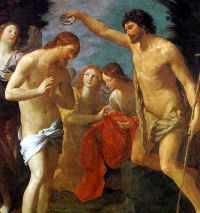You are my beloved Son; with you I am well pleased. (Luke 3:22)
Last year, before the London summer Olympics, the 1981 film Chariots of Fire was rereleased for the big screen. It’s a stirring true story about British runners at the 1924 Olympics—one of them, the Scottish sprinter Eric Liddell. The movie accurately depicts Liddell as a devout Christian. And though it shows him explaining his athletic motivation in words he probably never spoke—“When I run, I feel his pleasure”—the line is a window into how Liddell related to God in real life.
When I run, I feel his pleasure. Think about that statement for a minute. Are there times when you experience God’s delight in you? How would you fill in this blank? “I feel God’s pleasure when I _______________.”
Do you rest secure in the knowledge that your Father loves and affirms you? Or do you feel overlooked or rejected by a God who finds you wanting? If you oscillate between these two poles, as many of us do, you’ll find an important message in Jesus’ baptism.
Why, do you think, did the sinless Son of God embrace a baptism of repentance? One simple answer is this: so that each of us could hear our Father say, “You are my beloved child. With you I am well pleased”! This isn’t wishful thinking. When you were baptized, you were united to Jesus and drawn into his relationship with the Father. That means that as you seek it out, you really can experience the Father’s love for you!
Do you believe that God rejoices in you? If you’re not living in that reality, ask him for whatever you need to restore that baptismal flow of love—insight, healing, a spirit of repentance. Then, not only when you’re running, praying, or working, but at all times, you can rejoice in your identity as a beloved child who makes your Father smile.
“Jesus, with a thankful heart, I stand with you in the Jordan today. Let nothing separate me from you. Father, show me your love!”
Isaiah 42:1-4, 6-7; Psalm 29:1-4, 9-10; Acts 10:34-38
Questions for Reflection or Group Discussion
1. The first reading is one of several prophecies about Jesus in the book of Isaiah. How has Jesus fulfilled the prophecy described in the first reading?
2. In the Responsorial Psalm, we are invited to give to the Lord “glory and praise” (Psalm 29:1). What are some reasons from your own life that lead you to give the Lord glory and praise?
3. In the second reading, through his visit to Cornelius’ home, God broke through Peter’s misconceptions and prejudices towards non-Jews to reveal to him that the gift of knowing Jesus Christ as Lord and Savior was not for the Jewish people alone (as he had previously believed), but also for Gentiles as well. In the Church we see some of this in reverse now, that is, there are misconceptions and prejudices towards Jewish people. What are some of these prejudices? What steps you can take as Catholics to help eradicate these prejudices and promote mutual understanding between Christians and Jews?
4. In the Gospel, God the Father speaks these words to Jesus: “You are my beloved son; with you I am well pleased” (Mark 1:11). Spend a few minutes in prayer and reflection and allow God the Father to speak these same words to you: “You are my beloved son/daughter); with you I am well pleased.” What was your experience during this quiet time of reflection?
5. The meditation poses three profound questions: 1) “Are there times when you experience God’s delight in you?”, 2) “Why, do you think, did the sinless Son of God embrace a baptism of repentance?” and 3) “Do you believe that God rejoices in you?” How would you answer these questions?
6. The meditation also states that “When you were baptized, you were united to Jesus and drawn into his relationship with the Father. That means that as you seek it out, you really can experience the Father’s love for you!” Do you believe this? Why or why not?
7. Take some time now to pray and ask God the Father for a deeper knowledge and experience of his great love for you as his beloved son/daughter. Use the prayer at the end of the meditation as the starting point.








 The mystery of Christ’s baptism in the Jordan by St John, the Precursor, proposes the contemplation of an already adult Jesus. This mystery is infinitely linked to the Solemnities of the Lord’s birth and the Epiphany that we have just celebrated, as in some ways it takes up and represents their significance to us.
The mystery of Christ’s baptism in the Jordan by St John, the Precursor, proposes the contemplation of an already adult Jesus. This mystery is infinitely linked to the Solemnities of the Lord’s birth and the Epiphany that we have just celebrated, as in some ways it takes up and represents their significance to us. 
 Today we celebrate the baptism of Christ in the Jordan. This is the second epiphany, or manifestation, of the Lord. The past, the present, and the future are made manifest in this epiphany.
Today we celebrate the baptism of Christ in the Jordan. This is the second epiphany, or manifestation, of the Lord. The past, the present, and the future are made manifest in this epiphany. 



